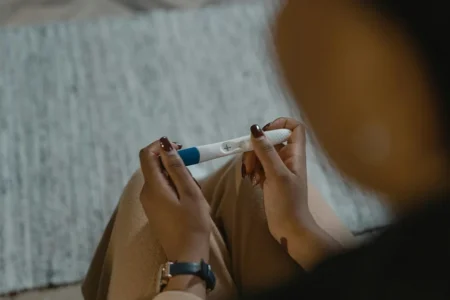Pregnancy After Miscarriage: What to Expect and How to Cope With It?
- Updated on: Mar 27, 2024
- 5 min Read
- Published on Apr 5, 2023

Losing your baby through a miscarriage is often a devastating and traumatic experience for women and their families. This experience can be extremely overwhelming for particularly the mother and many women often struggle with the idea of trying to conceive again. However, it is important to understand that miscarriage is not uncommon. There is still hope for future pregnancies. Though the devastating experience, the women goes through is still there.
A miscarriage is a spontaneous loss of a pregnancy before the 20th week. It generally occurs in approximately 10-20% of all pregnancies and can be caused by a variety of reasons such as chromosomal abnormalities, infections, hormonal imbalances in women and maternal health issues.
Miscarriage can have a significant emotional impact on women. It can cause certain feelings of sadness, grief, guilt and anxiety in women. They may feel like they have failed to take care of their baby and reach the term. Their partners may feel helpless or overwhelmed because of this loss. It is important to know and process these emotions responsibly and carefully to avoid long-term mental health issues in parents, particularly the mother. The thought of trying to get pregnant after a miscarriage again may be scary to most women.
However, it is important to discuss the possibility of a future pregnancy with your gynecologist or physician. It is also important to understand that most women who experience a miscarriage can have a healthy pregnancy later on. You must discuss future pregnancy options and plan carefully with your partners and gynecologist and arrive for an informed decision about having a child again.
What To Expect When Trying to Conceive After Miscarriage?
Physical changes in your body
Once you experience a miscarriage, your body may take some time to heal and return to its pre-pregnancy condition. Most women experience physical changes such as abnormal periods, changes in cervical mucus and a delay in ovulation. It is essential to observe your body and give it time for complete recovery before you try to conceive again. Some women may wait for a year, Other may wait for 2 years or even more depending on when they experience comfort and recovery.
Emotional changes and anxiety
Miscarriage can cause significant emotional changes in your body such as anxiety when you try to conceive a baby again. Women are very scared to experience another similar loss if they conceive which is why they may delay planning another child. It is important to communicate with your husband, your gynecologist or therapist about such feelings if you ever experience them. So as to help you work and resolve such issues.
Increased risk of another miscarriage
Unfortunately, women who have gone through a miscarriage are at a higher risk of getting another miscarriage again. However, it is important to understand that most women who experience a miscarriage in the first go can have a healthy pregnancy again in future.
Coping strategies for pregnancy after miscarriage
Emotional support from family and friends
Dealing with the loss of a miscarriage. Dealing with the loss of a pregnancy can be an extremely difficult experience for most parents particularly for the mother. However, it is important to understand that a well supported system in place can help you manage your emotional roller coaster when you try to conceive a child again. Your family and friends can provide a much needed support and words of encouragement and be there to celebrate when you try to become pregnant again. You should not be afraid to take support from these close friends and families during this time.
Counseling and therapy
Your head in contact, counseling and therapy. Your age start in a change paragraph. Sometimes talking to your professional care provider can be very helpful in coping with your emotional aftermath of a miscarriage. Your therapist can help you work through the feelings of emotional disturbances such as grief, anxiety and depression and provide you the right tools to help you manage stress and negative emotions that can cause you problematic, that can cause problems for you. They can also provide a safe space for you to talk with and help you overcome your fears and worries when you try to conceive a child again in future.
Mindfulness and stress reducing techniques
Usual practice mindfulness and stress reducing techniques to help you stay calm and comfortable during your emotional and physical challenges of getting pregnant after a miscarriage. You can adopt techniques like meditation, yoga, deep breathing exercises and journaling to help you manage anxiety problems and maintain a positive outlook toward conceiving again. You should take care of your mental and emotional health just as important as taking care of your other physical health related issues during the pregnancy journey.
Preparing for a healthy pregnancy after a miscarriage
Taking care of your body is important when you prepare for a healthy pregnancy after a first miscarriage. You should eat a balanced diet that is rich in different nutrients like folic acid, iron, calcium, vitamins that can help you reduce the risk of complications during pregnancy. You can do regular exercises such as walking or swimming which will also help you prepare for the demands of pregnancy and another childbirth.
Regular Prenatal Care in Monitoring
It is important to consider regular Prenatal Care for overall healthy pregnancy. This allows your doctor or your midwife to monitor the health of you and your baby and identify potential problems that can cause pregnancy complications early on. They also provide you necessary support and guidance through your pregnancy journey. You should attend all Prenatal Appointments and follow your health care providers advice judiciously to help ensure a safe and healthy pregnancy.
Making informed decisions about medical interventions
There may be certain medical interventions that your gynecologist can recommend to help you increase your chances of having a healthy pregnancy after a miscarriage. It is important to collect as much of information as possible that is relevant for you about such recommended procedures and medications to weigh the potential risks and benefits before making any pregnancy related decisions. You should trust your health care provider and being an active participant in your care. They can help you feel confident in your decisions and reduce stress and anxiety.
Common Concerns and Questions about Pregnancy After Miscarriage
Pregnancy after miscarriage can be a time of extreme anxiety and uncertainty for women. Here are some common concerns and questions that you may have during this time. It is important to discuss such concerns with your Health Care Provider.
- When is the right time to try again?
- Will I be able to become pregnant again?
- What should I do to prevent another miscarriage?
- How can I cope with the fear and anxiety of another miscarriage?
- When can I announce my pregnancy if there are chances of miscarriage?
- What are the important signs and symptoms of another miscarriage?
- What should I do to manage the emotional impact of pregnancy after a miscarriage?
- Will my pregnancy be considered a higher risk? If I had a miscarriage in the past.
- Should I undergo through any specific tests or procedures other than the conventional tests?
- What can I expect during prenatal care after a miscarriage?
These are common questions and concerns. If you also have similar questions, it is entirely normal and understandable. It is important to discuss these questions with your healthcare provider, your friends, family, to help manage your fears and anxiety and ensure a healthy pregnancy. It is also important to take care of your physical and emotional well-being and seek professional help if you need it. If you have the right support and resources, you can have a healthy pregnancy even after a miscarriage and welcome a healthy, happy baby into your life.











